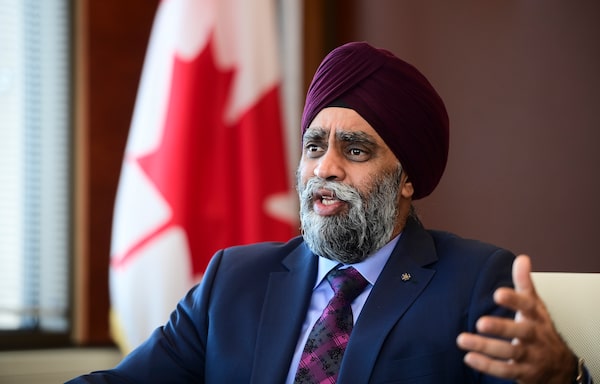
Minister of National Defence Harjit Sajjan takes part in a year-end interview with The Canadian Press at National Defence Headquarters in Ottawa on Dec. 17, 2020.Sean Kilpatrick/The Canadian Press
For days, Defence Minister Harjit Sajjan has been giving us a line. He is accused of burying his head in the sand, of refusing to look at evidence when told of an allegation of sexual misconduct against Canada’s most senior military officer. And he has rebuffed those criticisms by insisting he reported that allegation to the “proper authorities.”
But that’s not true. There are no proper authorities for handling a sexual-misconduct complaint against the officer at the top of the military chain of command.
That’s an important thing to remember. It’s also important to remember why those proper authorities don’t exist: because Mr. Sajjan ignored repeated calls to establish them.
When Prime Minister Justin Trudeau stands up now, as he did in the Commons on Wednesday, to acknowledge that the “many measures” his government has taken to address sexual harassment haven’t gone far enough, and to promise to do more, it cannot be a real mea culpa. There is no accountability, so it must be diversion and excuses.
Mr. Trudeau now says the government will create an independent mechanism to handle allegations of sexual misconduct in the military – after years when Mr. Sajjan ignored calls to do just that.
There is a double responsibility here. Mr. Sajjan not only didn’t create that independent body for complaints, he dodged responsibility for a complainant who didn’t have a better place to take her complaint. When an allegation against the then-chief of the defence staff, General Jonathan Vance, somehow made its way to him, Mr. Sajjan, the general’s direct boss, didn’t want to know.
In 2015, retired Supreme Court justice Marie Deschamps wrote a report on sexual harassment in the military that called for an independent body, outside the military chain of command, to deal with allegations of sexual misconduct. Members of the Canadian Forces, she reported, don’t trust the military to investigate itself.
That was just months before Mr. Trudeau came to power and mandated Mr. Sajjan to do something about sexual harassment in the military. But they didn’t do anything about Ms. Deschamps’ recommendation.
If a junior member of the Canadian Forces wanted to raise a complaint against a senior officer, the “proper” thing to do was to take it to the chain of command. Maybe it would go to military police, maybe not, but within the chain. Ms. Deschamps noted that there wasn’t a lot of trust in that.
Certainly, one can understand why the individual who wanted to raise a complaint against then-general Vance didn’t want to take it to officers under his command. Somehow, she decided to take it to the then-ombudsman for the Department of National Defence, Gary Walbourne, though that office isn’t really set up to deal with sexual-harassment complaints, either.
But Mr. Walbourne said that when he took that confidential complaint to his boss, Mr. Sajjan, the minister refused to look at the evidence.
We now know that Mr. Sajjan’s aide alerted the Prime Minister’s Office, who called in bureaucrats from the Privy Council Office, who spoke to the ombudsman, who told them he couldn’t reveal details of a confidential complaint to them. As far as we know, nothing much happened after that.
Now, Mr. Sajjan argues that he went to proper authorities, and that politicians shouldn’t look into sexual-harassment complaints. So who should? There was no independent body. The complainant couldn’t be expected to trust the military chain of command. The ombudsman felt he couldn’t discuss it with PCO bureaucrats. But he did take it to Mr. Vance’s superior: Mr. Sajjan.
Make no mistake, an anonymous allegation against the military’s ranking general was always going to be a headache for Mr. Sajjan. But that’s tough luck. It was the Defence Minister’s responsibility to do something – launch an inquiry, confront the general, or appoint an outsider to conduct a review and ask Mr. Walbourne to encourage the complainant to come forward.
It didn’t go very far. His aide advised the PMO that there was an unspecified allegation against Canada’s top officer. Now, Mr. Trudeau argues that no one had enough information to do anything. Except, of course, Mr. Sajjan might have had, if he hadn’t run away from it.
The one thing Mr. Trudeau never seems to have told Mr. Sajjan is that he’s the minister responsible for national defence, and he should act like it.
Know what is happening in the halls of power with the day’s top political headlines and commentary as selected by Globe editors (subscribers only). Sign up today.